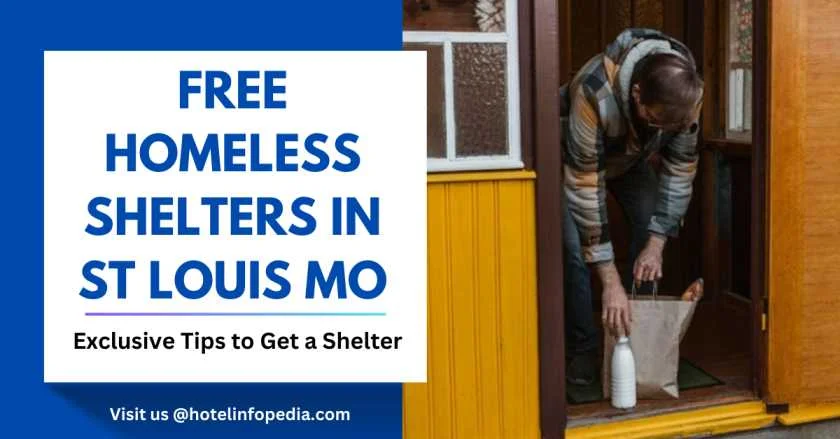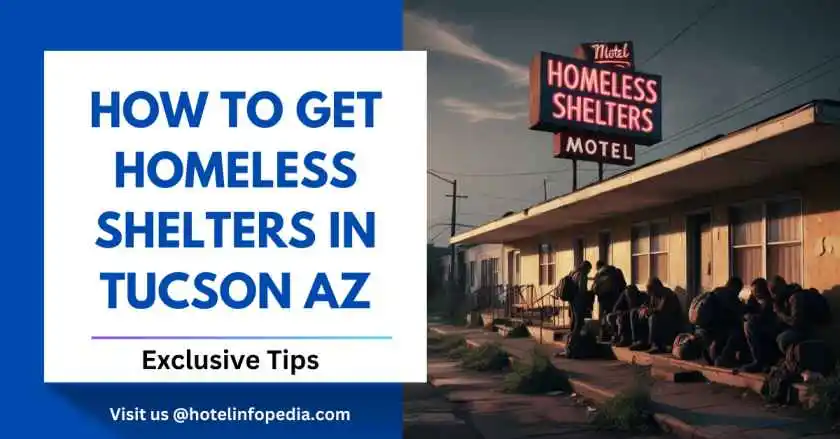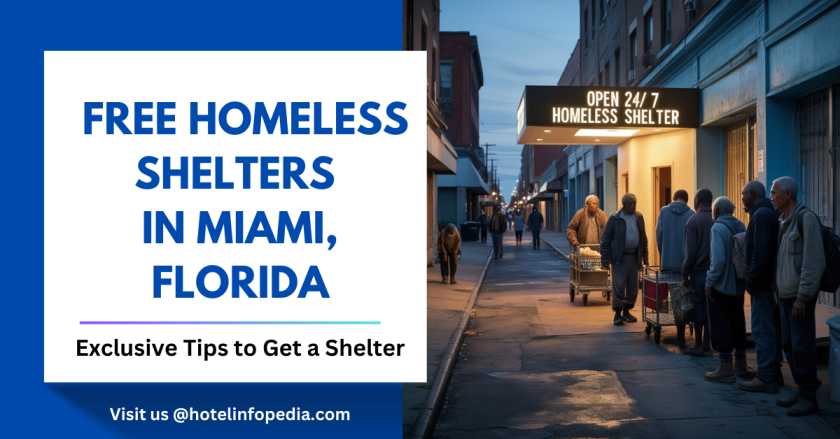Homelessness in St. Louis Missouri is a major social problem that affects individuals, families, and the broader community. Many factors contribute to homelessness including economic challenges, mental health problems, and the lack of affordable housing to solve this crisis the city responded with a network of shelters and support services.
In this article, we will explore the various homeless shelters in St. Louis, the services of the shelter, and how they make a difference in the lives of people in need. Whether you are looking for help, or want to support these important organizations? Or just hoping to understand the challenges facing the homeless community? This guide provides valuable insight into the resources available in St. Louis, MO.
Types of Homeless Shelters in St Louis, MO
St. Louis, Missouri, has a variety of shelters that cater to the diverse needs of homeless individuals and families. These shelters provide essential services such as food, housing, counseling, and resources to help people in need.
Below is an overview of the types of homeless shelters available in St. Louis:
Emergency Shelters
These shelters provide immediate, short-term assistance to homeless individuals and families. They are usually available on a first-come, first-served basis. and has basic amenities such as beds, food, and toilets.
Examples in St. Louis:
St. Patrick Center
Gateway 180
Family Shelters
These shelters are designed to keep families together. It provides accommodation and support services for both parents and children. They often provide educational support for children. parenting class and job assistance for adults.
Examples:
The Family Haven by The Salvation Army
Our Lady’s Inn
Women-Only Shelters
These shelters specifically serve women, often focusing on survivors of domestic violence, single mothers, or women facing other crises. Services include counseling, life skills training, and support groups.
Examples:
Room at the Inn
Safe Connections (for domestic violence victims)
Men-Only Shelters
These shelters address the needs of homeless men, providing necessities along with employment support and addiction recovery services.
Examples:
St. Vincent de Paul Shelter
Peter & Paul Community Services
Youth Shelters
Youth shelters require unaccompanied minors or homeless young people to provide a safe environment, educational assistance, consulting, and life skills training to prepare for independence.
Examples:
Covenant House Missouri
Youth in Need
Transitional Housing
This type of shelter is a bridge between emergency shelter and permanent housing. Residents typically stay for several months and they receive assistance such as job training, financial planning, and therapy.
Examples:
Places for People
Almost Home (for young moms and their children)
Faith-Based Shelters
These are operated by churches or religious organizations and provide housing along with spiritual support. They often serve as a starting point for individuals seeking a fresh start.
Examples:
The Haven of Grace
Sunshine Ministries
LGBTQ+ Friendly Shelters
These shelters focus on providing a safe and inclusive environment for homeless individuals who identify as LGBTQ+. They often address specific issues like discrimination and mental health challenges.
Examples:
Doorways (focused on those with HIV/AIDS)
Cold Weather Shelters
During winter months, these shelters open their doors to protect homeless individuals from harsh weather conditions. They may operate seasonally or during emergency weather advisories.
Examples:
St. Louis Winter Outreach
Biddle Housing Opportunities Center
Shelters for Veterans
The veteran-focused shelter aims to help homeless former service members by providing housing, mental health care, and employment support.
Examples:
Veterans Affairs St. Louis Health Care System
St. Patrick Center (Veteran-Specific Programs)
St. Louis has a wide range of homeless shelters tailored to meet the unique needs of various groups.
- Also read: Homeless Shelters in Orlando Florida
Top Homeless Shelters in St Louis, MO
St. Louis is home to many organizations dedicated to helping homeless individuals and families find stability.
Here are some of the top homeless shelters in St. Louis, MO:
Gateway 180: Homelessness Reversed
Gateway 180 is one of the largest emergency shelters in Missouri which provides support to families and individuals. They offer 24/7 service including temporary housing, meals, and counseling.
Address: 1000 N 19th St, St. Louis, MO 63106
Phone: (314) 231-1515
Website: gateway180.org
St. Patrick Center
A leading provider of housing and mental health services, St. Patrick’s Center helps individuals and families achieve long-term stability through job training, permanent housing, and health services.
Address: 800 N Tucker Blvd, St. Louis, MO 63101
Phone: (314) 802-0700
Website: stpatrickcenter.org
Peter & Paul Community Services
Peter & Paul Community Services focuses on homeless men, providing shelter, food, and supportive services to help them transition to permanent housing.
Address: 2612 Wyoming St, St. Louis, MO 63118
Phone: (314) 588-7111
Website: ppcsinc.org
The Salvation Army Family Haven
The Salvation Army Family Haven provides temporary shelter for families and single women, offering a safe environment with a focus on stability and independence.
Address: 10740 Page Ave, St. Louis, MO 63132
Phone: (314) 423-7770
Website: salvationarmyusa.org
Covenant House Missouri
This shelter focuses on homeless youth aged 16-24, offering a safe space, education support, and job training to help young people build a brighter future.
Address: 2727 N Kingshighway Blvd, St. Louis, MO 63113
Phone: (314) 533-2241
Website: covenanthousemo.org
Our Lady’s Inn
Our Lady’s Inn offers accommodations and resources for expectant mothers and young mothers. Their goal is to help women become independent while ensuring the safety and well-being of their children.
Address: 4223 S Compton Ave, St. Louis, MO 63111
Phone: (314) 351-4590
Website: ourladysinn.org
Doorways Housing Services
Doorways provide housing and supportive services to individuals and families affected by HIV/AIDS. They focus on creating a safe and stable environment for those in need.
Address: 4385 Maryland Ave, St. Louis, MO 63108
Phone: (314) 535-1919
Website: doorwayshousing.org
Room at the Inn
Room at the Inn serves homeless women and families by providing short-term shelter and comprehensive support services to help them transition to independence.
Address: 3415 Bridgeland Dr, Bridgeton, MO 63044
Phone: (314) 209-9181
Website: roomstl.org
These shelters play a vital role in addressing homelessness in St. Louis, providing not only temporary housing but also tools and resources for long-term stability. Whether you’re in need of assistance or looking to volunteer, these organizations are making a significant impact in the community.
- Also read: Emergency Rent Assistance St Louis City MO
Which Services Are Offered by Homeless Shelters in St Louis?
Homeless shelters in St. Louis provide a variety of services to meet the immediate and long-term needs of homeless individuals and families. These services are designed to help people achieve stability, access to necessary resources, and work to create permanent housing.
Below are the main services. Commonly available at homeless shelters in St. Louis.
☑️Emergency Shelter
Emergency shelters provide immediate, temporary housing for individuals and families experiencing homelessness. These shelters are open almost 24/7 and are generally a safe place to sleep for short periods.
☑️Case Management
Case management services help residents address personal barriers to stability, such as mental health issues, addictions, or employment challenges. Case managers work with individuals. To create an individual plan for the transition to permanent housing.
☑️Housing Assistance
Shelters provide various forms of housing assistance to help individuals and families transition from temporary shelter to stable, permanent housing.
☑️Food and Nutritional Support
Food services are an essential component of most homeless shelters, ensuring residents have access to nutritious meals.
☑️Childcare and Family Support
Some shelters offer child care for families with children. This allows parents to find work or join a program knowing their child is in a safe and supportive environment.
☑️Healthcare Services
Many shelters partner with healthcare providers to offer medical care for residents, which may include general health check-ups, vaccinations, and treatment for chronic conditions.
☑️Clothing and Hygiene Assistance
Shelters often provide necessities such as clothing and personal hygiene. So that individuals can maintain their dignity and good health while transitioning to permanent residence.
Homeless shelters in St. Louis provide a comprehensive range of services to support individuals and families experiencing homelessness. From emergency shelter and meals to job training, mental health services, and housing assistance, these shelters aim to address both the immediate and long-term needs of homeless individuals.
How to Receive Homeless Shelters in St Louis?
Accessing a homeless shelter in St Louis typically involves a few key steps. Understanding the process can help individuals secure the support they need.
Eligibility Requirements
Each shelter may have specific eligibility criteria. Common factors include:
- Proof of residency in St Louis or surrounding areas.
- Verification of income or lack thereof.
- Demonstration of need, such as eviction notices or other evidence of homelessness.
How to Apply for Homeless Shelters in St. Louis, MO?
Applying for a homeless shelter in St. Louis involves several steps to ensure that you receive the service you need. The specific steps, though, may vary slightly between different shelters. However, the general requirements below apply to most shelters in the city.
✔️Research Available Shelters
Before applying, it’s essential to research the shelters that best suit your needs. Different shelters provide services for families, individuals, men, women, youth, veterans, and those with specific needs such as mental health support or addiction recovery.
✔️Contact the Shelter
Once you’ve identified the shelter that suits your needs, the next step is to contact them directly. Most shelters require you to call, email, or visit in person to begin the application process.
✔️Complete the Intake Application
Most shelters require an intake form or application to gather necessary information about your situation. This step helps shelters assess your immediate needs and determine how they can best support you.
✔️Required information may include:
- Personal identification (e.g., ID, Social Security card).
- Proof of homelessness (e.g., a letter from a social worker, police report, or referral from another shelter or organization).
- Family information (if applicable).
- Medical and mental health history (some shelters provide specialized services for those with specific health or psychological needs).
Some shelters may also ask about your employment status, income (if any), and any criminal history. Be prepared to answer these questions honestly.
Guaranteed Tips to get Homeless shelter assistance
- Contact Shelters Early: Many operate on a first-come, first-served basis.
- Gather Necessary Documents: Identification, proof of income, or family records can speed up the process.
- Stay Persistent: If a shelter is full, ask about waitlists or referrals to other locations.
Conclusion
Homeless shelters in St Louis, MO, provide a lifeline to those in need. From emergency housing to job training and mental health support, these shelters play a critical role in the community. From here you can get the best shelters in St Louis MO.
FAQs
How to get an emergency housing voucher near St. Louis, MO?
The hotline is a centralized intake and referral system that can be accessed by calling 314-802-5444. The caller is interviewed by an intake specialist and, in the case of a crisis, is referred to an emergency shelter or a rental, mortgage, or utility assistance center.
Where is the best place to be if you are homeless?
For those who have no safe place to go or need emergency shelter, local Salvation Army shelters provide a warm, safe place for homeless men, women, and children to stay. At The Salvation Army, our doors are open every day and every night of the year.
What is the process to get into a shelter in St Louis?
The process typically involves contacting the shelter, completing an intake form, and providing necessary documentation like identification and proof of need.



